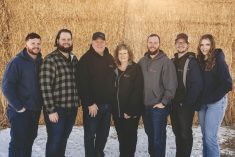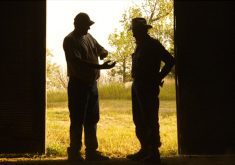These days, Mark Crawford says he’s at a point in his career where his family no longer worries about him in what can be a crazy profession. And for good reason.
This summer his fourth play in four years, Boys, Girls, and Other Mythological Creatures, is premiering in Ontario, and his first play, Stag and Doe is on stage in Kincardine, Ont., after having had seven productions in less than two years, ranking it as one of the most produced plays in Canadian theatre over the past decade.
Read Also

Ground rules for farm family communications
Establishing meeting ground rules can help your family find ways to communicate that work for your farm. Here are some…
Bed and Breakfast also played at the Centaur Theatre in Montreal this spring, and The Birds and the Bees will be produced five times over the next year in theatres from Kamloops, B.C,. to Victoria-by-the-Sea, P.E.I., after opening at the Prairie Theatre Exchange in Winnipeg at the end of March.
Crawford continues to act, meanwhile, and recently wrapped up a month of performing in two Shakespeare plays at the Winter Garden Theatre in Toronto, and he also moved from Toronto to Stratford so he’s back closer to the family farm and the rural Ontario that he writes about in his plays.
It’s been an impressive five years, transitioning from actor to actor-playwright. Beyond the positive reviews and sold out shows, for Crawford there are great rewards in creating work that brings people out to the theatre, especially for those who may not regularly go. “It’s cool to just give people a really fun night out, and to be a part of that, to give them a different experience. A fun night has great value, especially in the crazy times we’re living in.”
It’s also, it turns out, a good time to be a farm-based, rural Canadian playwright, or artist of almost any kind.

Partly, that’s because the stage is ready for rural plays. In fact, if you’re from rural Canada and watching a Crawford play, you feel like you’re in on the secret. “It’s part of the whole movement of Canadian theatre that came out of the early ’70s about actually going back into places where real people live and making plays about them. It carries on in that tradition,” Crawford says. “We shy away from acknowledging specific cultures within our bigger culture. I think a place like Newfoundland has really embraced that but the rest of the country maybe shies away from it.” That’s something Crawford’s plays are helping to change.
“It’s important to say, ‘hey, where you live and who you are, and your life and your community have value.’”
Crawford’s plays may be set in a specific place, based on the family’s farm just outside the small Ontario town of Glencoe, population 2,100 or 2,200 depending on which sign you read, but the themes are universal. Stag and Doe had a successful run at the Neptune Theatre in Halifax last year even though they don’t have Stag and Does in Nova Scotia. Some at the theatre worried that people wouldn’t come to the show or understand what it was about. But, “ultimately it’s about weddings and it’s about small communities and in Nova Scotia they have lots of those things,” Crawford says. “And people always fall in love and people always screw up.”
But rural Canadians also have unique insights into stereotypes, especially since so many city dwellers make so many generalizations about country hicks.
At bottom, it may be why Crawford thinks so much about stereotypes when he writes his plays. He says he’s interested in “peeling back the layers of characters and revealing more than we first assume.”
That might lead to showing rural characters who are more sophisticated and complicated than the stereotypical straw-chewing yokel that you might see wearing overalls in someone else’s play, but there’s more to it than that. In fact, his shattering of audience assumptions works both ways. In The Birds and the Bees, for instance, he says “the rural characters are revealed to have deep and complicated inner lives — romantic and sexual — but also the one character who’s not from a rural community first appears as a bike-riding, juice-cleansing, ultra-nerd, but by the end we see him as a very smart, deep-thinking, compassionate, fully rounded character.”
The stereotypes go both ways, Crawford says, and the theatre is the perfect place to set them up and then crash them all together for all to see.
But on top of that, there’s another reason why growing up on the farm is good training for a young artist, Crawford says.
If you want a primer for being an artist, growing up as a farmer can be good preparation for the realities of an actor or playwright’s life because, as he says, “sometimes there’s money that’s coming in, sometimes there’s no money, sometimes you’re just in incredible debt, sometimes you can pay off that debt. And you plant a crop and hope to hell it grows and you get paid seven months from now.”
Rural southern Ontario is the backdrop for each of Crawford’s plays. It is a place, he says, with its own, largely unacknowledged traditions, its own way of speaking and its own way of looking at the world.
It was one of these unique rural traditions, his brother’s Stag and Doe, that provided the inspiration for his first play. A Stag and Doe (also called a Buck and Doe or Jack and Jill) is an event held by a young, soon-to-be-married couple to raise money to cover the costs of their wedding. Anyone can attend, and lots do, as it’s sometimes the only thing happening on a weekend night in a small town.
Crawford started writing in the summer of 2012 while acting at the Blythe Festival, a theatre close to Lake Huron. For the previous decade, he had worked full time as an actor. That is, he says, “as much as anyone in the Canadian theatre works full time.”
The Blyth Festival was founded in 1975 largely to produce plays that reflect the culture of southwestern Ontario. It’s a place where there is always a lot of writing happening and Crawford was inspired. He thought back to his brother’s Stag and Doe in 2004, which he had helped out with. “I always thought it was a really funny, weird, very specific cultural rite of passage,” Crawford says. “I thought, ‘maybe there’s a play in there somewhere.’”
Two years later, Stag and Doe premiered at Blyth. The play takes place in the kitchen of a community hall in a small town in southwestern Ontario. A couple is preparing for their Stag and Doe later the same day when a distraught bride-to-be enters and demands to use the hall, as the tent she was going to get married in had blown away in a storm. Being a small town, the characters have an entangled history. Combine this with the usual stresses of weddings, booze, and a catering crew that has landed in jail, and you have the ingredients for a wickedly funny play.
Watching Stag and Doe, it’s obvious that it could only have been written by someone who grew up on a farm, with the dialogue peppered with references to 4-H, heifers, and catering by the United Church Women. One character runs home to do chores, gossip gets shared at the liquor store, and it’s no surprise to find out that folks are connected in all sorts of ways — whether it’s the sharp-tongued lady at the store who turns out to be the maid-of-honour’s aunt, or another who used to babysit the grocery store cashier.
There’s nothing simple or inherently boring about rural life, Crawford says.
“Sometimes we’re so inundated with American TV that we don’t always give value to the place where we live,” he says. “I do think it’s important to say ‘your place in the world is equally important as all the stuff we see that takes place in New York City.’”















